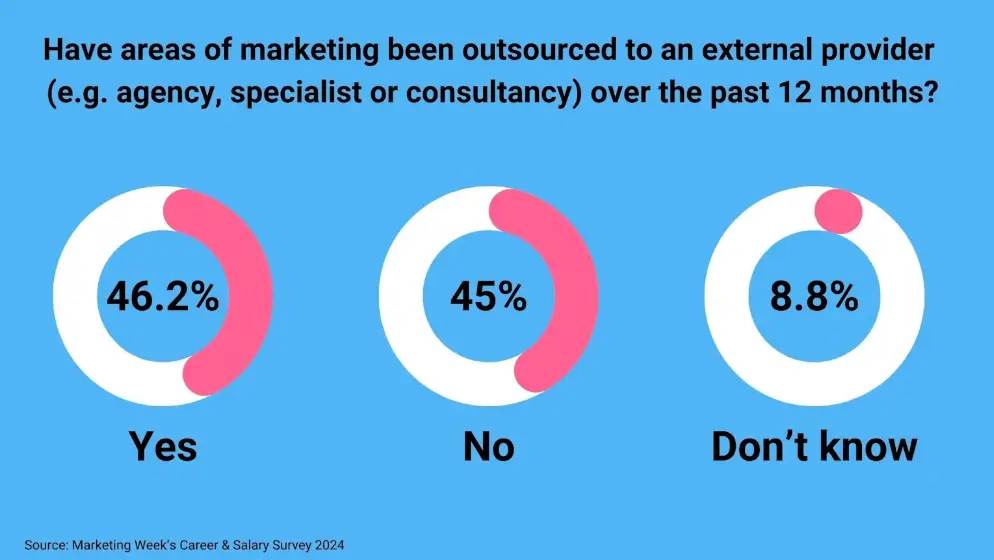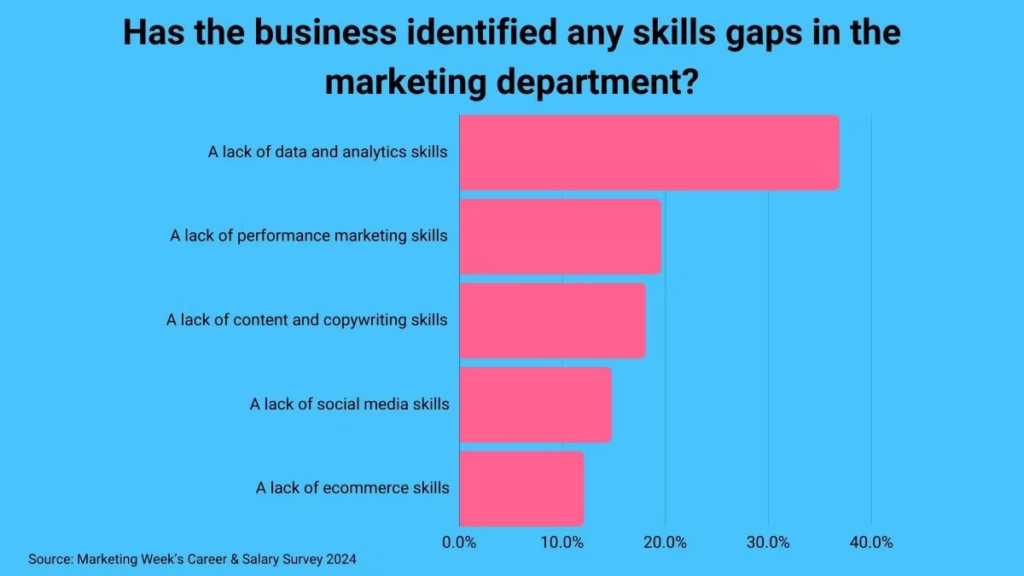Every early stage or scaling company has been there: a limited budget coupled with the pressure to see quick marketing results. So, how to achieve it? You know you need those results and there isn’t a lot of room for error.
Should you outsource it all to an agency?
A freelancer? Many freelancers?!
Do you bring it in-house and build your own team?
There’s also a common lose-lose reality when you hire someone internally, who turns around and brings an agency to actually ‘do the doing’.
It’s a quick path to decision paralysis, yet the ‘sink or swim’ reality of startup life mandates a decision. So you consult your budget spreadsheets, you weigh the pros and cons, and ask for referrals and opinions from those you trust.

It’s not an easy decision and as we can see, opinions are split. So far this year, 46% of marketing efforts were outsourced to an external provider, up from just 25% in 2020. 45% of businesses chose to build their own in-house marketing team instead. So when is it right to do so? Equally, when is it not?
I see three viable options:
- Keep it all in-house
- Hiring an agency (also requires an in-house team/contact)
- Work with freelancers
In-House Marketing Teams
Pros
- Dedication & familiarity: An in-house team is solely focused on your company’s goals and the brand itself. A good team lives and breathes all aspects of the company and there’s a lot of value of having a team fully in-tune with the other business functions, from product, sales, etc. You’re more likely to have integration and alignment across it all. The same can be achieved when you outsource your marketing, but it takes a concerted effort and is easier to achieve in-house.
- Clear brand presence: A good in-house marketing team will fully embrace your brand and will have singular control over how its presented in the market, increasing your chance of a cohesive and aligned brand presence.
- Direct control: When you keep marketing in-house, it stays in your direct control. You can dial things up or down personally and immediately. Pending the stage and ability level of your team, this can be a crucial one.
Cons
- Overhead costs: Hiring an in-house team comes with significant expenses beyond just salaries. You have to consider benefits, pensions, office space, and other related costs. Startups are full of twists and turns, often made more stressful when you have a team of people to support.
- Risk of mismatch: All of the pros above are contingent on having a really good marketing team. There are some mediocre marketers in the world, and it’s hard to discern in an interview. If your new hire isn’t the right fit, it’s challenging and expensive to pivot.
- Lack of marketing experience: In all likelihood, a startup’s first marketing hire will be someone junior. That often means great things for practical execution and your runway, but it runs the risk of lacking strategic direction. A startup needs both – specialist brand and marketing strategic oversight, paired with efficient and effective practical execution.
These are the gaps most in-house marketing teams are experiencing:

Hiring an External Agency
Pros
- Specialism: Marketers are up against a challenge. They are asked to wear so many hats – be a strategist, then be able to write copy, come up with all creative concepts, then launch our ads that maximise ROI. It’s impossible to be an expert in all of these things. With an agency, you get experts in their individual craft, all aligned and working together.
- Creativity: It’s a generalisation, but the best campaigns come through partnership with an agency. You can get access to creative specialism that thrives on variety and novelty, whose entire role and desire is to make your brand stand out creatively. They’re ideas that don’t often come from a generalist and beginner-level marketer – justifiably. An agency creative has a very different specialty than in-house marketers.
- No long-term commitment: You can easily test out agencies on a specific project before committing to more work with them.
Cons
- Management challenges: Management of external agencies can feel like a full-time job in itself. Ensuring everyone is on the same page, upholding the same brand, etc., gets harder and harder with the more agency partners you have.
- It’s a bit of a ‘both/and’ situation, where you need someone internally to manage the agency AND the agency… a bit of a lose-lose when budget is tight.
- Dedication: It’s unlikely you’re getting 100% of your agency’s time (and if you are, it’s time to hire in-house!). They need and should hold you to a scope of work, and it’s helpful to embrace the reality that you’re not the agencies sole focus.
- Upfront cost: While it’s a very different kind of cost from an internal team, the initial proposal can feel overwhelming. And often, you get what you pay for. The big agencies are not right for the early-stage startups, and it can be hard to find the quality that meets your budget.
Hiring freelancers
Pros
- Flexibility – You can outsource your entire marketing function through to specific campaigns or specialist services. It’s even more flexible than typical agencies, as you’re getting specialist individuals without the ‘we come as a team’ overhead. Do you need someone to just write your emails? Or, do you need support on your whole marketing strategy and execution? You can hire freelancers for either scenario, big or small.
- Specialism – much like agencies, you can get access to a skillset or specialty that you wouldn’t full-time in-house, but you still need it to be done well. Freelancers are great for this. You get right to the source.
- Cost efficiency – No overheads and no agency costs either… it’s arguably the most cost-effective way to go.
Cons
- Quality assurance – It’s not hard to find them… any LinkedIn search will do it (or heaven forbid, Upwork), but do you really know who you’re getting and what level of quality they’ll deliver?
- Management of freelancers can be time-consuming – you need to get them aligned to your goals, strategy and ways of working. And then do that for as many freelancers as you have, who all operate in their own silo.
- You’re not their only priority – just as with agencies, it’s unlikely that you’re their only focus. You don’t get 100% of their time and attention.
The ‘freelanced agency’ model
With a ‘little bit of this’ and a ‘little bit of that’, there’s a way to get the most out of these scenarios in a ‘best of all worlds’ kind of way.
A project with Penner Collective looks like this:
- You work with a strategist – we get to know your business and team really, really well. We take a look at where you’re at, then develop the strategy and action-oriented plan to move forward.
- We hand-pick the freelancer team that you actually need. They’re freelancers that we often work with and always trust, specifically selected for the specialism and experience your project requires. And it’s only what you need – if you love writing your social media posts, you continue on with it. You may not need a full creative team, but perhaps a brand designer and a videographer. It’s everything you need and nothing that you don’t.
- We manage and align the team – the strategic alignment and project management sits with us. Though freelanced, we operate as an agency and deliver projects as one unit, aligned to the same strategic vision and always ensuring the highest quality.
We often start to feel like the ‘in-house’ extension of your team as work continues and the relationships strengthen. We’re there to help train and equip your internal team. When you’re ready, we can help you hire and train new team members. We can be here for strategic oversight for a check-in or quarterly/annual workshop. Every company is different, and we’d love to help you carry on your marketing success in whatever way works for you.
Would you like a consult?
We’d love to hear about your business and help determine your specific pros and cons of all the marketing resourcing options. There’s never obligation or pressure – it’s a pleasure to hear about your company.
Visit www.pennercollective.com/contact to set up a call.


+ show Comments
- Hide Comments
COMMENT